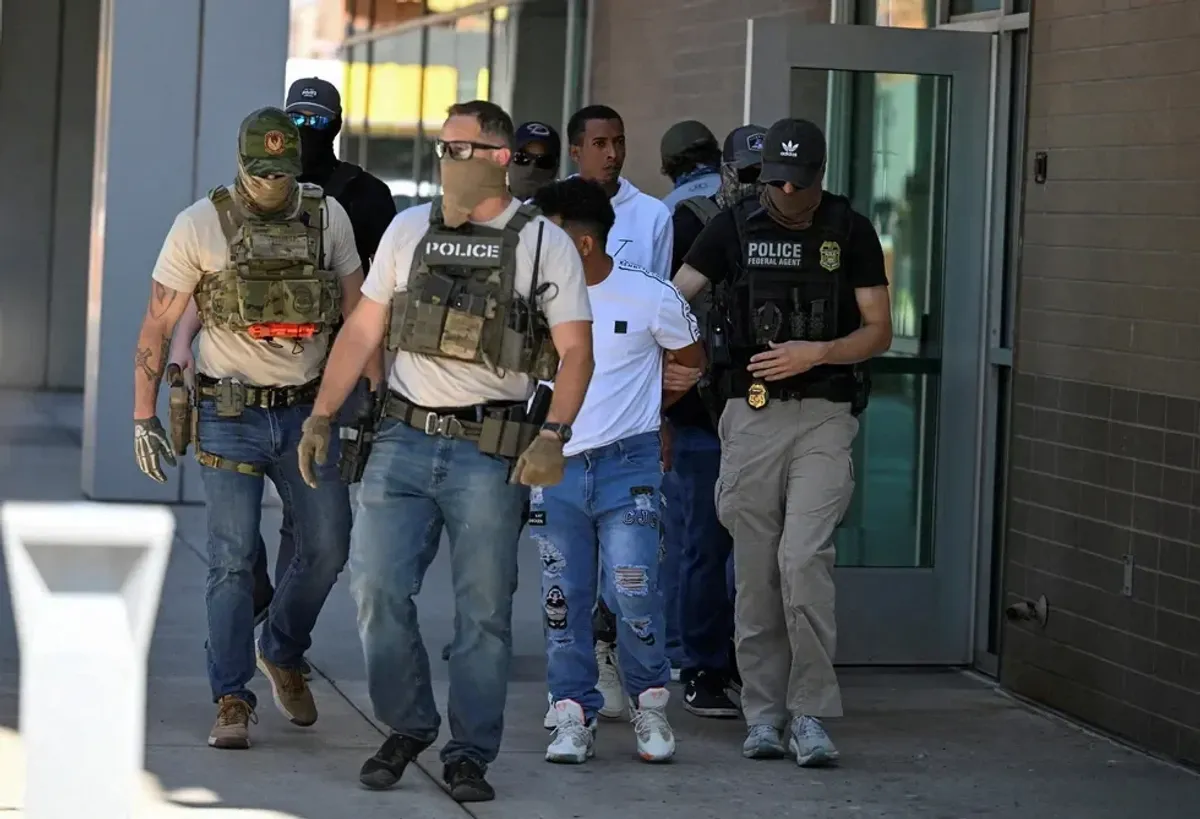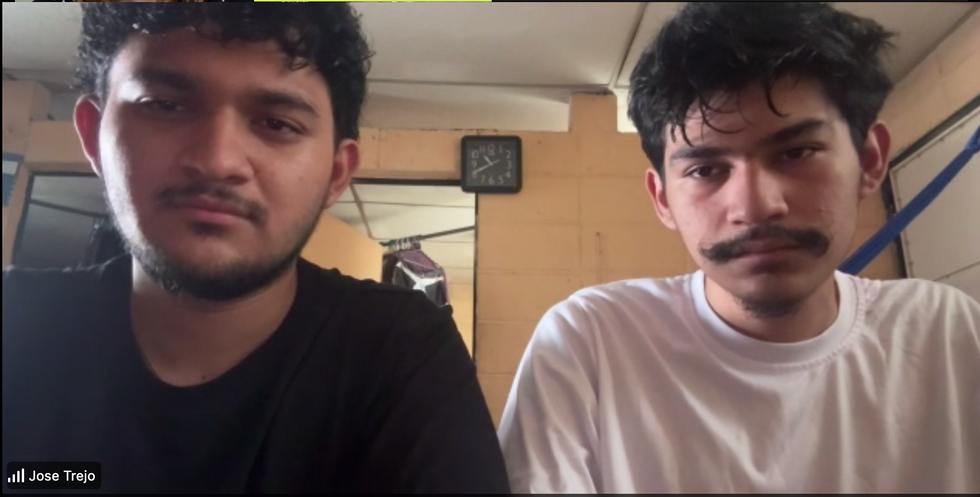
Though the Trump administration has declared a crusade to remove “criminal illegal immigrant killers, rapists, gangbangers, and other violent criminals” from the United States, immigrants who are farm workers, expectant parents, recent high school graduates and newlyweds have found themselves swept up in raids by U.S. Immigration and Customs Enforcement (ICE).
Families and friends have increasingly turned to fundraising platforms such as GoFundMe, looking for help with legal fees, living expenses, travel costs and medical bills as loved ones — often primary breadwinners — are detained, deported or await immigration hearings, sometimes hundreds of miles from home.
“I've been working in the refugee immigrant space for the last 20 years [and have] been watching things escalate,” said Luma Mufleh, founder of Fugees Family, a nonprofit school network for refugees, who started her own fundraiser for an 18-year-old recent graduate detained by ICE, despite his Special Immigrant Juvenile Status.
“You're hearing these stories of people being arrested that are not supposed to be the target profile, but it hit really differently when it was one of our own.”
A spokesperson for GoFundMe said the company didn't have a specific fundraiser count or a calculation of money raised related to immigration raids. But hundreds of ICE-related fundraisers currently appear on the site.
A Raw Story review of 60 randomly selected GoFundMe fundraisers — just a fraction of the fundraisers on the website — showed more than $1.7 million donated to families across the U.S.
Fundraiser titles included:
- “Support Maria Laura, Henry, and their unborn baby”
- “Single Mom Needs Help After Husband's Deportation”
- “Stand with Nacho: Urgent Family Support After ICE Abduction”
- “Support for a Family Torn Apart by ICE”
Fundraiser organizers who spoke with Raw Story expressed gratitude for donations received but detailed ongoing trauma for themselves and loved ones often taken unexpectedly to experience allegedly inhumane treatment. Some said they had experienced online harassment in response to fundraisers.
Last week, Raw Story reported the case of two brothers, Jose and Josue Trejo Lopez.
Two months after deportation to El Salvador, despite their pending Special Immigrant Juvenile Status petition, the brothers were diagnosed with Post-Traumatic Stress Disorder and depression following their detention experience where their lawyer says they were “treated inhumanely,” Raw Story reported.
A fundraiser for the brothers, “Jose & Josue: Stranded and Seeking Hope,” raised nearly $35,000 toward a $50,000 goal.
 ‘Treat you like animals’: Deported brothers ask Trump for help with ICE 'trauma' Jose and Josue Trejo Lopez speak with Raw Story via Zoom
‘Treat you like animals’: Deported brothers ask Trump for help with ICE 'trauma' Jose and Josue Trejo Lopez speak with Raw Story via Zoom
Department of Homeland Security Assistant Secretary Tricia McLaughlin told Raw Story: "Why does the media continue to fall for the sob stories of illegal aliens in detention and villainize ICE law enforcement?"
Asked about potential fundraiser fraud, a GoFundMe spokesperson who declined to be named, “given the sensitivity of the topic,” said verified fundraisers undergo an “enhanced due diligence review process,” which includes “human review” and “technical tools designed to catch misuse.”
All personal information is verified before funds are transferred, the spokesperson said.
“GoFundMe also has the first and only donor protection guarantee in the crowdfunding industry. We guarantee donors a full refund in the rare case something isn’t right,” the spokesperson said.
‘When will it happen again?’
Joanna Martinez, a 22-year-old daycare worker in Charlotte, N.C, started a GoFundMe fundraiser in May after her father, Jose Martinez, was pulled over by immigration agents on his way to work, in what she called an instance of “racial profiling.”
“They basically threatened him. It was like, ‘If you don't get out the vehicle, you and your coworkers, we will take you guys out by force by breaking the windows,’” Joanna told Raw Story.
Jose, a construction worker, is not a U.S. citizen but is working with a lawyer to “see if there's any way that he could get papers,” Joanna said, adding that her father has lived in the U.S. for 20 years and all of his children are citizens.
Jose was detained for two days in his home state then spent 26 days at a detention facility in Lumpkin, Ga. before being released on $4,000 bond, Joanna said.
“We're, of course, happy my dad was able to get out, but just the trauma and not knowing when will it happen again, or will it happen to someone else in our family? That's what we're worried about,” Joanna said.
Joanna said she twice visited her father while he was detained six hours away in Georgia. She said he told her he witnessed two deaths while detained. At least one 45-year-old man died in ICE custody at the facility, according to news reports.
“People were sleeping on the floors. The food that they were feeding them, most of it was either spoiled, or it had maggots inside,” Martinez said.
“He said that they had him in really, really cold temperatures in there.”
The Department of Homeland Security denies any mistreatment of detainees.
"Any claim [of[ subprime conditions at ICE detention centers are false. All detainees are provided with proper meals, medical treatment, and have opportunities to communicate with their family members and lawyers," McLaughlin said.
"Ensuring the safety, security and well-being of individuals in our custody is a top priority at ICE."
Joanna had raised $3,665 toward a $5,500 goal for help with her father’s bond payment, lawyer fees and living expenses, since “he can't work as much as he was because of the worry,” she said.
‘He’s lucky’
Mufleh said one of her network’s students, Ernesto Manuel-Andres, was recently taken by ICE while eating lunch at his home in Bowling Green, K.Y.
“I really wasn't panicked when that happened. I was like, ‘He just got caught up. It was a mistake. He shouldn't be in detention. They'll release him the next day,” Mufleh told Raw Story. “That didn't happen.”
Manuel-Andres, who came to the U.S. from Guatemala as a minor, spent three weeks in “very crowded” detention facilities, moved through two facilities in Kentucky and was transferred to Monroe, La., Mufleh said.
“It's an 18-year-old kid that has status,” Mufleh said. “There was no warrant for his arrest. He's not a criminal.”
Mufleh said she launched a GoFundMe partly as a way to inform community members about Manuel-Andres’ situation and to get “some pressure out to get him out.”
When Manuel-Andres was released on bond three weeks later, Mufleh and his school principal traveled to Louisiana to pick him up. His next hearing is in January.
“I think he's lucky. He had attorneys already in place that were familiar with his case. He had a community ready to advocate for him and raise funds for him,” Mufleh said.
“How many thousands of kids in the same situation are in detention right now that we're not hearing their story? That's what's scary, is there are lots of them.”
‘Swarmed us’
A 34-year-old teacher, who declined to be named after receiving harassing messages in response to her fundraiser, started a GoFundMe for her husband after he was detained following a hearing related to an application for a spousal visa.
“He absolutely did not think anything was going to happen,” she said.
“But, I, as an American citizen, having seen how things went with the first Trump administration, I took the day off. I wanted to know exactly what happened when he went to the courthouse.”
When the teacher and her husband were leaving the courthouse, ICE officers “just swarmed us,” she said, adding: “As we turned the corner, I heard the handcuffs get put on him, my husband, and it felt completely surreal.”
“I knew it was a possibility that this could happen, but all the emotions that came with it, I did not expect.”
The teacher, from San Leandro, Calif., said at one point that day she was told her husband, who came from Colombia and “entered at a legal point of entry” seeking asylum, would be released with monitoring.
But as they prepared to leave again, they were chased down and her husband was detained again, she said. He has since been in a detention facility four hours from home, and is considering self-deporting.
“We're at a point of just whatever gets him out of that facility, even if it means him going back to Colombia, and if that's the case, there's definitely some fears there, but at least he would be free,” the teacher said.
“It's just limbo, and it's all so incredibly frustrating, because even the lawyer, she cannot figure out why he's actually being detained, like a legal reason why.”
The teacher had raised a little over $10,000, which she said was being used for gas to visit her husband, vending machine purchases at the detention facility, legal expenses, and living costs while on just her teacher's salary.




